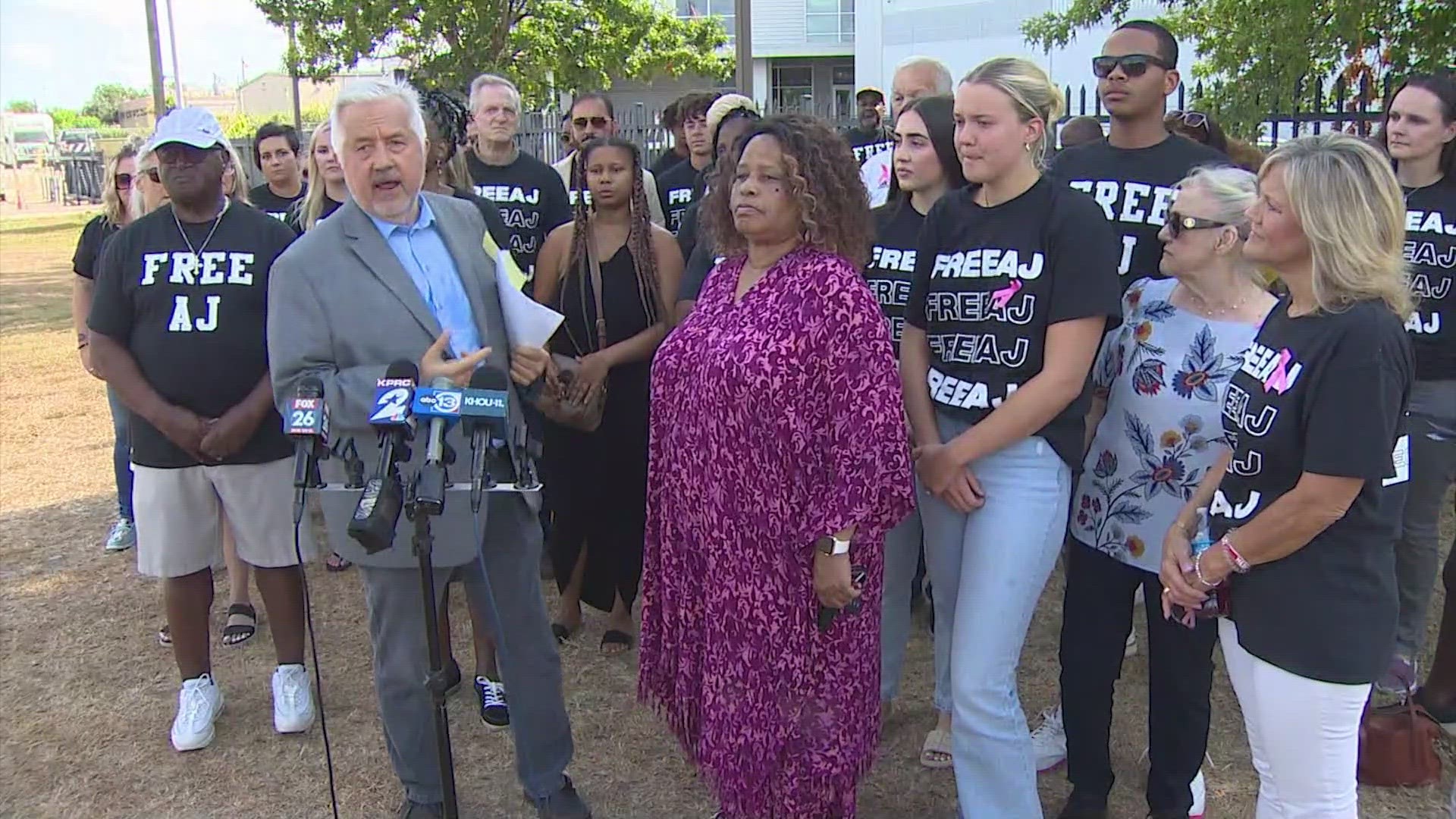HOUSTON — The family of now-convicted murderer Antonio "AJ" Armstrong Jr. said their fight for justice isn’t over.
On Saturday morning—civil rights attorney Randall Kallinen held a press conference with Armstrong’s family and friends, saying they received a complaint against one of the state’s expert DNA witnesses.
They claim this complaint proves that blood evidence found on Armstrong Jr.’s T-shirt was planted and that the state’s expert witness had a history of planting evidence before.
Armstrong Jr.’s family is still standing by his side after a guilty verdict.
“If I had an inkling of a thought that AJ Armstrong, my grandson killed my son, and my beautiful daughter-in-law, we wouldn’t be supporting him,” Armstrong Jr.’s grandmother said.
Civil rights lawyer Randall Kallinen filed a federal lawsuit this week claiming the state’s expert witness and HPD officers planted evidence.
Kallinen claimed it was the difference in the third capital murder trial.
“The guy wanted a conviction, flat out. And apparently, he was willing to do this, he was willing to take this very highly suspect evidence and put it in the court system,” Kallinen said.
On Thursday, after Armstrong was found guilty of murdering his parents, Kallinen received a complaint filed to the Texas Forensic Science Commission in 2019.
Dr. Robert Collins filed the complaint claiming the state’s expert -- Celestina Rossi -- and other investigators with the Montgomery County Sheriff’s Office and a Willis Police Department sergeant planted evidence in a different capital murder case.
According to the 63-page complaint, Dr. Collins claimed Rossi caused a previously fully processed/clean murder suspect’s car and the seat covers from the murder victim’s car to be brought together many years after the alleged murder.
“At a bare minimum, this complaint puts Rossi on notice that handling materials with victim’s DNA evidence on it and handling the clean, processed materials (such as Armstrong’s T-shirt) is improper and can transfer DNA evidence,” the complaint said.
In Dr. Collins’ report, he writes that Rossi planted fabricated DNA evidence in an attempt to falsely convict Fred Dexter Lee in the capital murder of Brandon Brazel in September 2007. He also alleged that Rossi and other crime scene investigators “had lied” and said then Assistant District Attorney Andrew James ‘chose to cover up their transgression.’
According to Dr. Collins’ report, investigators located Lee’s car five and a half years after the crime and had a Texas ranger test the car for blood evidence, which the ranger’s report states he did not see anything that would indicate any evidence. Rossi had it tested a second time and said they found evidence.
“After Rossi and Ramirez did find blood evidence in the car, Ramirez sends [Willis Police Dept. Sgt. Kevin] Rooney to the Willis Police Department evidence room to get the two untested seat covers obtained from the crime scene in 2007. This is a clear violation of any crime scene processing method,” the report states.
Kallinen said during his press conference on Saturday the complaint was not investigated, but believes it should have been given to Armstrong’s defense attorneys in the criminal trial.
“They should’ve handed over the complaint but they didn’t hand over the complaint, that’s really bad. That's a high level of badness,” Kallinen said.
He argued that this violates the Brady rule requiring prosecutors to hand over any exculpatory evidence to the defense.
This week, KHOU 11 legal analyst Carmen Roe said the allegations in the federal lawsuit are troubling if true—but difficult to prove.
“It’s going to be nearly impossible for them to show that one individual or individuals planted this evidence in this case, but in this criminal trial we’ve heard from HPD officers who say they never saw any blood on his shirt and somehow it gets there,” Roe said.
We asked Roe if it is possible for blood to be present even though none of the officers say they saw it on the day of the murder in 2016.
“I think that anything is possible, especially if you believe the expert that the state presented, who suggested that it was absolutely something that could’ve occurred, and did occur in this case, that there was no tampering, there was no planting of evidence and that this is the way that blood spatter can occur,” Roe said.
After the guilty verdict, prosecutors said the jury was confident in its decision without needing the new blood evidence.
Kallinen believes there will be a motion filed for a new criminal trial, which can be done within 30 days of the verdict.

